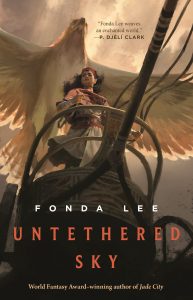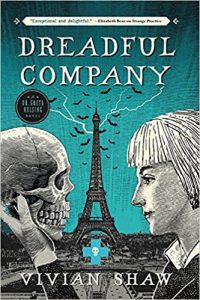Gary K. Wolfe Reviews Untethered Sky by Fonda Lee
 Untethered Sky, Fonda Lee (Tordotcom 978-1-250-84246-6, $22.99, 160pp, hc) April 2023
Untethered Sky, Fonda Lee (Tordotcom 978-1-250-84246-6, $22.99, 160pp, hc) April 2023
Fonda Lee won considerable acclaim for the worldbuilding skills on display in her award-winning Green Bone series, but she also knows the power of restraint. Her new novella, Untethered Sky, borrows its key elements from Persian and Greek legends – ravenous manticores with a taste for human flesh and monstrous rocs who are the manticores’ sole predators – but from a worldbuilding point of view, it’s practically minimalist. We eventually learn that we’re in a largely agricultural Middle Eastern-inspired kingdom called Dartha, with expansionist ambitions and ‘‘barbarian tribes’’ on the frontier, but Lee’s focus from the outset is on her appealing but tough-minded narrator, Ester. Having narrowly escaped the manticore that killed her mother and younger brother, Ester joins the Royal Mews to undergo training as a ruhker – essentially a wrangler of the enormous birds known as rocs, who constitute the kingdom’s most effective weapon against the marauding manticores. Assigned a young roc named Zahra, Ester quickly learns that rocs are anything but cuddly, and that their relationship with the ruhkers is less a partnership than a hazardous but mutually beneficial alliance; some ruhkers can even be killed by their own rocs. Readers who at this point might be hoping for something like National Velvet with raptors are in for some bracing surprises, but Lee’s decision to refrain from facile sentimentality is one of her story’s greatest strengths. In a way, her treatment of the rocs is almost science fictional, resonating with the ‘‘let animals be animals’’ approach that we’ve seen in such recent SF novels from Ray Nayler and Lee Mandelo.
It’s not that Zahra and the other rocs are uninteresting; each has individual quirks and habits, but it’s never clear that the love and devotion that ruhkers develop for them is at all meaningfully reciprocated. Ester’s agony at the loss of her family, however – she became estranged from her father after her mother and brother were killed – is deeply felt and skillfully nuanced. As she progresses through her training at the mews, her initial motivation to gain revenge is gradually supplanted by her fascination with Zahra, her unexpected friendship with a colleague, and her tentative relationship with fellow ruhker Darius. At the same time, Lee’s action scenes are escalated with brisk efficiency, from early training missions involving various luckless wildlife to a Great Hunt organized by an ambitious general determined to rid the kingdom of manticores once and for all, which turns into a brutally effective combat sequence.
The promotional material for Untethered Sky describes it as an ‘‘epic fable,’’ which isn’t an inappropriate term. It’s been used off and on for decades to describe focused, self-contained narratives that imply a much larger history, and while we learn what we need to about the kingdom of Dartha and its beasts, I felt no pressing need to explore the world beyond the story. As vividly realized as the monsters are, the story finally belongs to Ester, learning to transform devastating loss into a sense of community, a devotion to mission, and finally to a mature sense of accommodation. There may be other stories to tell, and maybe even more spectacular beasts, but this one is all hers, and in the end it’s disarmingly lovely.
Gary K. Wolfe is Emeritus Professor of Humanities at Roosevelt University and a reviewer for Locus magazine since 1991. His reviews have been collected in Soundings (BSFA Award 2006; Hugo nominee), Bearings (Hugo nominee 2011), and Sightings (2011), and his Evaporating Genres: Essays on Fantastic Literature (Wesleyan) received the Locus Award in 2012. Earlier books include The Known and the Unknown: The Iconography of Science Fiction (Eaton Award, 1981), Harlan Ellison: The Edge of Forever (with Ellen Weil, 2002), and David Lindsay (1982). For the Library of America, he edited American Science Fiction: Nine Classic Novels of the 1950s in 2012, with a similar set for the 1960s forthcoming. He has received the Pilgrim Award from the Science Fiction Research Association, the Distinguished Scholarship Award from the International Association for the Fantastic in the Arts, and a Special World Fantasy Award for criticism. His 24-lecture series How Great Science Fiction Works appeared from The Great Courses in 2016. He has received six Hugo nominations, two for his reviews collections and four for The Coode Street Podcast, which he has co-hosted with Jonathan Strahan for more than 300 episodes. He lives in Chicago.
This review and more like it in the May 2023 issue of Locus.
 While you are here, please take a moment to support Locus with a one-time or recurring donation. We rely on reader donations to keep the magazine and site going, and would like to keep the site paywall free, but WE NEED YOUR FINANCIAL SUPPORT to continue quality coverage of the science fiction and fantasy field.
While you are here, please take a moment to support Locus with a one-time or recurring donation. We rely on reader donations to keep the magazine and site going, and would like to keep the site paywall free, but WE NEED YOUR FINANCIAL SUPPORT to continue quality coverage of the science fiction and fantasy field.
©Locus Magazine. Copyrighted material may not be republished without permission of LSFF.








